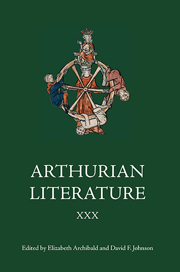Book contents
- Frontmatter
- Contents
- General Editors' Foreword
- List of Contributors
- I Magic and the Supernatural in Early Welsh Arthurian Narrative: Culhwch ac Olwen and Breuddwyd Rhonabwy
- II How Green was the Green Knight? Forest Ecology at Hautdesert
- III Edward III's Arthurian Enthusiasms Revisited: Perceforest in the Context of Philippa of Hainault and the Round Table Feast of 1344
- IV Pagan Gods and the Coming of Christianity in Perceforest
- V Malory's Sources for the Tale of the Sankgreal: Some Overlooked Evidence from the Irish Lorgaireacht an tSoidigh Naomhtha
- VI ‘Transmuer de rime en prose’: The Transformation of Chrétien de Troyes's Joie de la Cour episode in the Burgundian Prose Erec (1450–60)
- VII La Rétro-écriture ou l'écriture de la nostalgie dans le roman arthurien tardif: Ysaïe le Triste, Le Conte du Papegau et Mélyador de Froissart
- VIII Remembering Brutus: Aaron Thompson's British History of 1718
- Contents of Previous Volumes
V - Malory's Sources for the Tale of the Sankgreal: Some Overlooked Evidence from the Irish Lorgaireacht an tSoidigh Naomhtha
Published online by Cambridge University Press: 05 March 2014
- Frontmatter
- Contents
- General Editors' Foreword
- List of Contributors
- I Magic and the Supernatural in Early Welsh Arthurian Narrative: Culhwch ac Olwen and Breuddwyd Rhonabwy
- II How Green was the Green Knight? Forest Ecology at Hautdesert
- III Edward III's Arthurian Enthusiasms Revisited: Perceforest in the Context of Philippa of Hainault and the Round Table Feast of 1344
- IV Pagan Gods and the Coming of Christianity in Perceforest
- V Malory's Sources for the Tale of the Sankgreal: Some Overlooked Evidence from the Irish Lorgaireacht an tSoidigh Naomhtha
- VI ‘Transmuer de rime en prose’: The Transformation of Chrétien de Troyes's Joie de la Cour episode in the Burgundian Prose Erec (1450–60)
- VII La Rétro-écriture ou l'écriture de la nostalgie dans le roman arthurien tardif: Ysaïe le Triste, Le Conte du Papegau et Mélyador de Froissart
- VIII Remembering Brutus: Aaron Thompson's British History of 1718
- Contents of Previous Volumes
Summary
Malory's Tale of the Sankgreal (henceforth M) is generally considered the ‘least original’ of his adaptations, conforming in most significant respects to the plot of the Vulgate Queste del Saint Graal (Q). The main alterations Malory appears to have made are thematic; most notably, he clearly downplays the mystical and devotional flavour of Q in his work. However, the precise extent of Malory's manipulation of his materials is hard to quantify, since the version of Q from which he was working does not match any known version of that text. Eugène Vinaver suggested that Malory's exemplar was probably closer to the lost common original of Q than to any of the surviving versions of the text. No French-language manuscript has yet been discovered that seems to represent the version known to Malory, but that does not necessarily mean that Malory's work is the only witness to this particular version of Q. The evidence of the medieval Irish translation of the Vulgate, Lorgaireacht an tSoidigh Naomhtha (L), has, so far, been largely overlooked. L's editor, Sheila Falconer, believed, like Vinaver, that the exemplar for her text ‘ranked high in the MS tradition of the Quest’ and, significantly, there are numerous points at which L and M share details not found in any known version of Q. It seems possible that L was translated from a version of Q close to, or identical with, the version Malory knew and, as such, may provide the best witness we have to the characteristics of his exemplar.
- Type
- Chapter
- Information
- Arthurian Literature XXX , pp. 87 - 100Publisher: Boydell & BrewerPrint publication year: 2013



